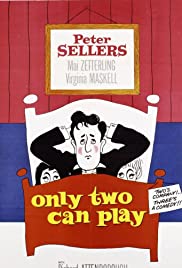Sidney Gilliat’s Only Two Can Play presents 1960’s
Wales as a smutty cauldron of repressed desire, the lid barely on at the best
of times, and often threatening to extravagantly explode. Peter Sellers plays
John Lewis, a married librarian with two children, squeezed into a barely
tolerable living space (we’re told early on that an extra £150 a year would
make all the difference), his workday punctuated by knowing looks from women on
the bus and subtext-heavy book requests (it’s plain that any item with “sex” in
the title just flies off the shelves). Liz (Mai Zetterling), doubly glamorous
by virtue of being an immigrant married to a wealthy town councilor (the movie
presents the class system at its most unctuously all-defining) takes a shine to
him and dangles the prospect of using her influence with her husband to get him
a promotion (and that dreamy £150 raise) – this goes better than their would-be
affair, perpetually set back by accidents and interruptions. Sellers’
performance walks a fine line between being subtly low-key and completely blank
(over time, the balance would tend to shift more toward the latter), with a few
rather ill-fitting moments of escalating mishap in which one can almost glimpse
Clouseau just around the corner; more affecting is Virginia Maskell as his wife,
rapidly tuning in to what’s going on but lacking the resources to do much more
than ask that he leave her out of it, as long as he hands over the housekeeping
money. Despite a cautiously happy ending, interesting for its tentatively
compromising nature, the film leaves a prevailingly sad impression, and Zetterling
seems generally out of place (especially if you know that she was just a few
years away from directing some absolute masterpieces), but then that’s largely
the point. As a bonus, the combination of Welsh names, accents and the odd bit
of language or local insight allows the film a modest cultural distinctiveness.


No comments:
Post a Comment